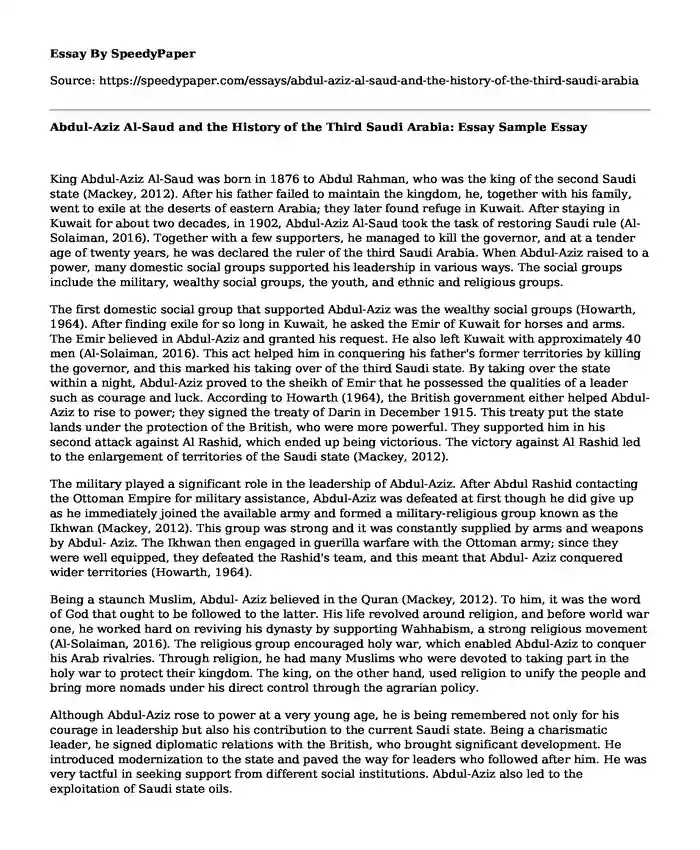
| Type of paper: | Essay |
| Categories: | Historical & political figures |
| Pages: | 3 |
| Wordcount: | 645 words |
King Abdul-Aziz Al-Saud was born in 1876 to Abdul Rahman, who was the king of the second Saudi state (Mackey, 2012). After his father failed to maintain the kingdom, he, together with his family, went to exile at the deserts of eastern Arabia; they later found refuge in Kuwait. After staying in Kuwait for about two decades, in 1902, Abdul-Aziz Al-Saud took the task of restoring Saudi rule (Al-Solaiman, 2016). Together with a few supporters, he managed to kill the governor, and at a tender age of twenty years, he was declared the ruler of the third Saudi Arabia. When Abdul-Aziz raised to a power, many domestic social groups supported his leadership in various ways. The social groups include the military, wealthy social groups, the youth, and ethnic and religious groups.
The first domestic social group that supported Abdul-Aziz was the wealthy social groups (Howarth, 1964). After finding exile for so long in Kuwait, he asked the Emir of Kuwait for horses and arms. The Emir believed in Abdul-Aziz and granted his request. He also left Kuwait with approximately 40 men (Al-Solaiman, 2016). This act helped him in conquering his father's former territories by killing the governor, and this marked his taking over of the third Saudi state. By taking over the state within a night, Abdul-Aziz proved to the sheikh of Emir that he possessed the qualities of a leader such as courage and luck. According to Howarth (1964), the British government either helped Abdul-Aziz to rise to power; they signed the treaty of Darin in December 1915. This treaty put the state lands under the protection of the British, who were more powerful. They supported him in his second attack against Al Rashid, which ended up being victorious. The victory against Al Rashid led to the enlargement of territories of the Saudi state (Mackey, 2012).
The military played a significant role in the leadership of Abdul-Aziz. After Abdul Rashid contacting the Ottoman Empire for military assistance, Abdul-Aziz was defeated at first though he did give up as he immediately joined the available army and formed a military-religious group known as the Ikhwan (Mackey, 2012). This group was strong and it was constantly supplied by arms and weapons by Abdul- Aziz. The Ikhwan then engaged in guerilla warfare with the Ottoman army; since they were well equipped, they defeated the Rashid's team, and this meant that Abdul- Aziz conquered wider territories (Howarth, 1964).
Being a staunch Muslim, Abdul- Aziz believed in the Quran (Mackey, 2012). To him, it was the word of God that ought to be followed to the latter. His life revolved around religion, and before world war one, he worked hard on reviving his dynasty by supporting Wahhabism, a strong religious movement (Al-Solaiman, 2016). The religious group encouraged holy war, which enabled Abdul-Aziz to conquer his Arab rivalries. Through religion, he had many Muslims who were devoted to taking part in the holy war to protect their kingdom. The king, on the other hand, used religion to unify the people and bring more nomads under his direct control through the agrarian policy.
Although Abdul-Aziz rose to power at a very young age, he is being remembered not only for his courage in leadership but also his contribution to the current Saudi state. Being a charismatic leader, he signed diplomatic relations with the British, who brought significant development. He introduced modernization to the state and paved the way for leaders who followed after him. He was very tactful in seeking support from different social institutions. Abdul-Aziz also led to the exploitation of Saudi state oils.
References
Al-Solaiman, S. (2016). Architecture as a tool of editing history: The case of Saudi Arabia's King Abdul-Aziz historical center. Traditional Dwellings and Settlements Review, 27(2), 38-53. http://www.jstor.org/stable/24720019Howarth, D. A. (1964). The desert king: Ibn Saud and his Arabia. McGraw-Hill.
Mackey, S. (2012). The Man They Called Ibn Saud. The National Interest, (120), 89-96. www.jstor.org/stable/42896470
Cite this page
Abdul-Aziz Al-Saud and the History of the Third Saudi Arabia: Essay Sample. (2023, Dec 27). Retrieved from https://speedypaper.com/essays/abdul-aziz-al-saud-and-the-history-of-the-third-saudi-arabia
Request Removal
If you are the original author of this essay and no longer wish to have it published on the SpeedyPaper website, please click below to request its removal:
- Free Essay Sample about Napoleon Bonaparte
- Free Essay with a Speech Analysis: Obama Presidential Candidacy Announcement
- An Analysis Essay Sample of A Connecticut Yankee In King Arthur's Court
- Article Review: Trump Threatens Tariffs on All Imports From China; Escalating Trade Feud
- The US-Mexico Border and the Trump Wall, Essay Example
- Slavery and the Second Amendment, Free Essay in American History
- Essay Example. Christopher Columbus and His Discovery of America
Popular categories




